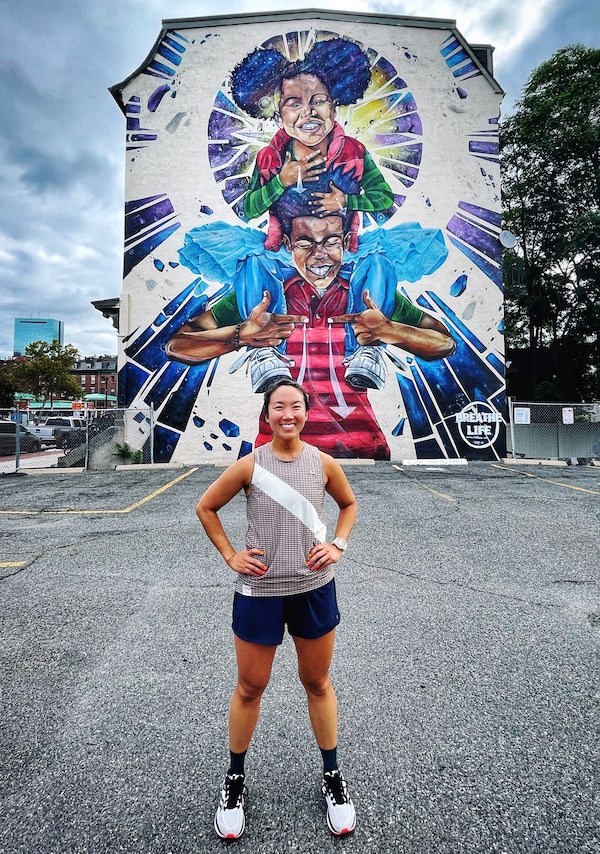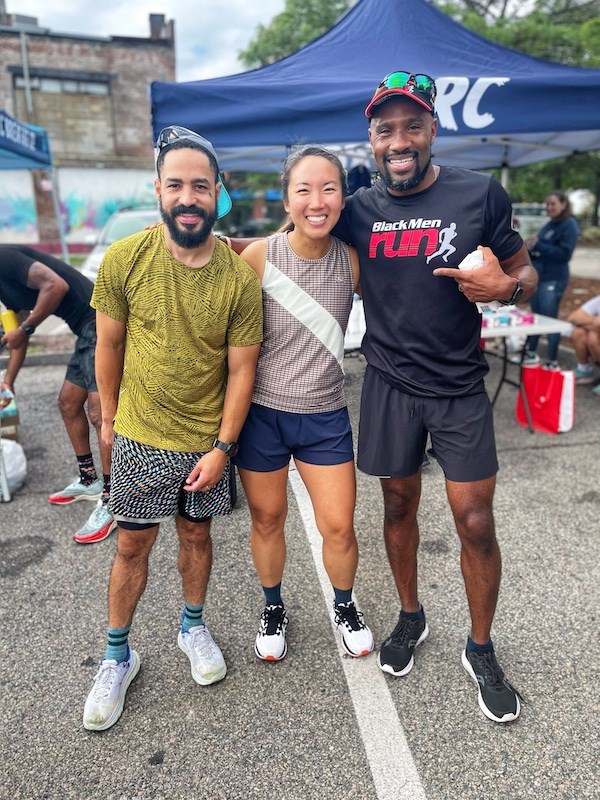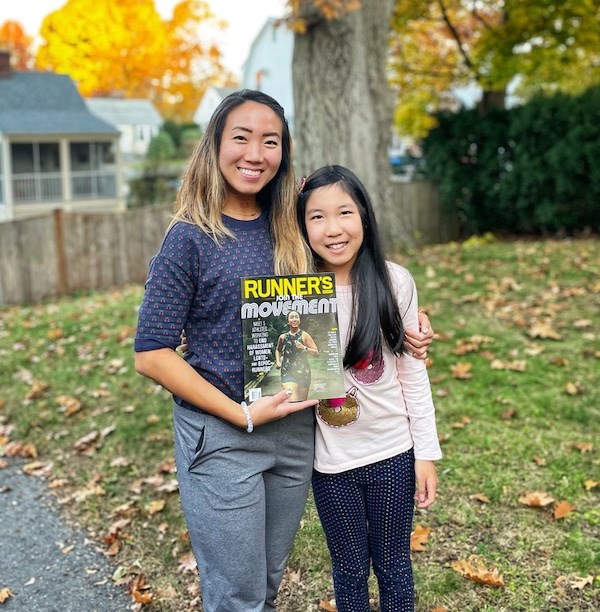Breaking Up with Instagram (and Finding Myself in the Process)

Carolyn in Roxbury, Boston in front of a mural titled "Breathe Life" by Roxbury artist Problak.
Carolyn Su, the founder of the Diverse We Run platform, shares some reflections in this NYRR Contributors Circle blog post.
The biggest change I’ve undergone in life recently has been to get off social media—namely, Instagram.
How It Started
A little background for context.
I joined Instagram when it first debuted in 2010—incidentally, also the year that my eldest child was born. Instagram was unlike anything else at the time. It didn’t have a 140-word limit, it wasn’t a long-form, public diary like a blog, and you couldn’t share links or videos. The modest, squared space was purely a way to share grainy-filtered photos with family and friends: instantaneous snapshots of the day-to-day. Beautifying the mundane.
And that’s where I found joy and connection, as I shared small, pocket-sized updates of my daughter in toddlerhood, home cooking experiments, travel adventures, glorious sunsets, and occasionally, the scenes encountered while on a run.
In 2017 I decided to pursue the goal of qualifying for the Boston Marathon. Naturally, I didn’t want to take on this endeavor by myself, so I made my Instagram profile public and sought out others in the so-called, online running community.
I’ve previously shared about the factors that led to the creation of Diverse We Run, in 2019, and how it felt like a fight to simply get people to acknowledge that a person’s race shapes their entry into and experience within the sport of running. In May 2020, the news of George Floyd’s murder brought about a nation-wide racial reckoning. Suddenly, DEI was trending, and everyone from podcasters to local run groups to major running brands wanted to listen and learn from the experiences of BIPOCs. Followership for Diverse We Run blew up overnight!
My inbox was constantly full (both on Instagram and in email), and I was suddenly being asked to speak on multiple podcasts each month, to participate in photo and video shoots, and even to help chair the boards for various running groups.

Pictured with Carolyn from left to right: Sid Baptista, founder of the PIONEERS Run Crew and performance streetwear clothing line PYNRS and Jeff Davis, founder and president of the Boston chapter of Black Men Run.
Saying Yes
For many years of my adult life, I felt like I was trying to convince others that racial discrimination and inequities still existed and were pervasive in our society—especially in running!—so when it seemed like the world was finally listening, why wouldn’t I choose to make the most of their time and attention?
I wanted to be the change I wished to see.
I wanted to be the change my children needed.
I wanted to be the "window and mirror" for Asian American representation that were desperately lacking in the sport.
So I said yes. I said yes to it all.
I said yes to keeping my personal IG public.
I said yes to interviewing, writing, and amplifying the stories of athletes of color, week after week.
I said yes to unpaid labor, all for the sake of helping provide education to all the white folks who wanted to “pick my brain” and to learn and “do better.”
I said yes to speaking up and using my voice in advocacy, not just for my own community, but for all BIPOC communities.
I took up space.
I repeatedly pushed myself out of my comfort zone.
I fielded on-going comments and messages antagonizing the work of equity and inclusion.
I held space for those hurting, especially as the pandemic enunciated the disparities in resources, healthcare, and life expectancy amongst socioeconomic lines, directly impacting BIPOC communities.
I found myself somehow firmly established in this role as a community-connector and educator—a bridge and guide between various groups and communities. It wasn’t until someone introduced me as one that I realized: somehow or another, I’d become an influencer.
Not only was this a role I did not ask to take on, I was also not at all interested in the twisted, parasocial relationships that start to inevitably form among influencers and their followers.
But I’m the firstborn child of Chinese immigrants, which means I am hard-wired to be a people-pleaser and to carry the weight of the future in my hands for all those around me. Words of validation were rarely ever (if ever) uttered to me by my parents, so the feedback from my social media posts was like fat droplets of spring rain on the cracked and dry winter ground of my heart. Every "like," story-reply, or DM gave me just enough moisture to keep going, to keep on laboring, to keep on sharing myself and my life online.
It’s for representation, I would remind myself.
If I don’t take up space, then who will?
If I don’t speak up, then who will?
Rise of the Run-fluencer
During the global pandemic, more and more people took to going outside as their primary means for movement and sanity, leading to a rise in online “run culture” and birthing the rise of the “run-fluencer.” Running now trends worldwide, so much so that even the fast fashion industry has hopped onto the wave.
Naturally, this has changed the feel of social connection online. Community-building and social-connection have been moved down the priority list for social media platforms, falling far behind profits and advertising. Algorithms now promote SEOs and encourage users to grow a new product: themselves.
The past few years have been challenging for the social media users who started with Instagram upon its inception. Not everyone wants to spend hours creating videos and reels to recap every gel consumed or piece of gear worn on a 5-mile run, nor does everyone have the time and energy to do so—at least, I don’t. As my children get older and their socio-emotional needs increase, I’ve realized that my time isn’t simply a commodity, it’s a currency. Time spent stringing together story sets, video editing, writing thoughtful posts, and replying to DMs and comments ends up costing me the bandwidth to be focused and present with my teens (not to mention the fog of emotional dysregulation that I’m always left blinking through, after scrolling social media).

Carolyn with her daughter.
Disconnecting
Last August, I unintentionally took a break from social media when I went home to visit my parents, whose WiFi was finicky.
The one-week break became two, which then became four.
Surprisingly, instead of getting panicked about losing engagement (previously a long-standing fear that kept me constantly tied to the app), I found myself feeling liberated.
As much as I hated to admit, I felt calm.
It was like my entire nervous system was resetting, shifting from blasting at full-speed-ahead like an express train to settling into a more even, steadier pace that was manageable for an extended period of time.
I suddenly seemed to gain a whole lot more time.
I had more mental clarity, which resulted in more confidence in decision making in the day to day.
I was present and engaged with my family and those IRL, right in front of me. I realized I could have longer, cohesive thoughts and conversations that were not truncated or abbreviated.
"Is this what it feels like to be limitless?!" I wondered.
It wasn’t all sunshine and roses, however, don’t get me wrong.
Immediately after the initial euphoria of not feeling chained by algorithms and engagement, I fell into a mild depression and crisis of identity and purpose. It was totally unexpected and caught me off guard! I had grown so accustomed to the outsourcing of worth and validation—the constant (and easy) affirmation received from all the story-likes, DM's, and emoji reactions – that without them, I suddenly felt uncertain about whether or not the things I did on a day-to-day basis were meaningful. I also started to feel scared about losing relevance, and I questioned whether or not my advocacy work still bore any impact.
What am I doing in life?
Does what I do even matter?
It took some time for me to get to a place of self-awareness and to get back to my core identity and values—who I am and what drives me in life—and I've had to get used to feeling the discomfort of the unknown (i.e., how can I do work that is meaningful to me that isn’t reliant on social media? How do I continue to amplify under-represented voices in other mediums? WHO AM I IF I AM NOT ON INSTAGRAM?).
I’ve learned to settle into trusting that if I'm still alive and well today, then my story and my work is not yet finished! The future can be both unknown AND exciting. I can bear influence right where my feet stand, in the different spheres I move around, right here and right now.
I’ve revisited aspects of local, community engagement in my town, and gotten more active in the civics projects at my kids’ schools.
I’ve hosted impromptu gatherings with neighbors, scheduled breakfasts with friends, and enjoyed unstructured time with family.
I’ve finally started to knock out all the books queueing on my shelves, and I’ve also rediscovered the joys of journaling and the practice of writing just for me (and not for anyone else to read, like, or subscribe).
I’ve also unintentionally become the interim cross country and track coach for my son and his friends, and they are now all training to race a 5K for AAPI Heritage Month!
I’ve lost a lot of internet followers, marketing gigs, and statistical engagement, according to whomever keeps track of all of that.
At the same time, I’ve found myself and gained a much greater, fuller sense of what it means to be alive.
Honestly? That’s a win in my books!